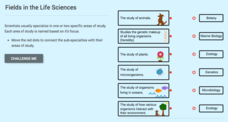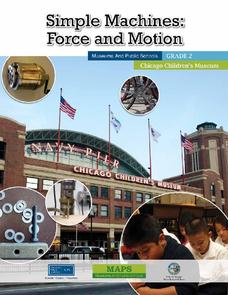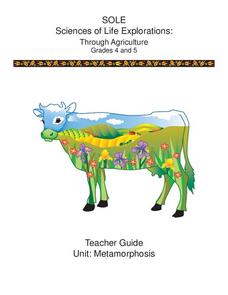CK-12 Foundation
Fields in the Life Sciences
Many fields of study require a specialty and a sub-specialty as you progress through your education. Scholars learn about six sub-specialties of life science. From botany to zoology, our knowledge of the world of living organisms expands...
Mascil Project
Molecular Gastronomy - Science in the Kitchen
Some say cooking is an art—and a science! Scholars scope out the savory subject of molecular gastronomy with a series of related activities. The teacher's guide contains printable worksheets and helpful tips for implementing the lesson.
Ask a Biologist
It’s a Plankton Eat Plankton World
For as small as they are, plankton sure play an enormous role in maintaining marine ecosystems. Dive into an investigation of these tiny organisms with a hands-on life science activity in which children cut out pictures of sea animals...
NOAA
Ocean Acidification
If tap water is more acidic than ocean water, why are we so concerned about ocean acidification? The third installment of a 23-part NOAA Enrichment in Marine sciences and Oceanography (NEMO) program focuses on carbon dioxide levels in...
BBSRC
Discovering DNA: The Recipe for Life
A pinch of adenine, a dash of thymine and ta-da, you have life! Well, it's not quite that simple, but through this series of activities and experiments young scientists learn about the structure of DNA and how it contains the recipe for...
Biology Junction
Origin of Life
Aristotle explained the idea of spontaneous generation, a concept which lasted almost 2,000 years before scientists proved it wrong. Scholars learn about the history of our understanding of the origins of life. They read examples of...
Berkshire Museum
The Three Life-Giving Sisters: Plant Cultivation and Mohican Innovation
Children gain first-hand experience with Native American agriculture while investigating the life cycle of plants with this engaging experiment. Focusing on what the natives called the Three Sisters - corn, beans, and squash - young...
Sargent Art
Protect Our Marine Life
Encourage water conservation and boost art skills with a hands-on activity that challenges young painters to create a scene highlighting marine life. Using oil pastels, scholars draw an underwater scene and write a tip for viewers to...
NASA
The Science of the Sun
There's more to that glowing ball of light in sky than most children realize. From the overall structure of the solar system, to the changing of the seasons, these hands-on lessons open the eyes of young scientists to the important role...
Biology Junction
Photosynthesis: Energy and Life
All life requires energy ... and the connection between energy and plant life typically requires photosynthesis. Scholars explore photosynthesis in depth from ATP/ADP through the Calvin cycle. A helpful presentation highlights concepts...
Chicago Children's Museum
Simple Machines: Force and Motion
Get things moving with this elementary science unit on simple machines. Through a series of nine lessons including teacher demonstrations, hands-on activities, and science experiments, young scientists learn about forces, motion, and...
PBS
Blow the Roof Off!
Blow the minds of young scientists with this collection of inquiry-based investigations. Based on a series of eight videos, these "hands-on, minds-on" science lessons engage young learners in exploring a wide range of topics from making...
Curated OER
Unit 1: Water is Life: The Heart and Science Behind this Phrase
Water, water, everywhere — but will there be enough to drink? Check out these detailed lesson plans to meet NGSS water cycle and CCSS literacy standards in your science classroom. Learners do a close reading of a challenging, poetic text...
National Nanotechnology Infrastructure Network
Is Measuring an Art or a Science?
Not only do future engineers learn the difference between accuracy and precision, they also get some hands-on experience using different measuring tools.
Curated OER
Mealworms
Crawl into the world of the darkling beetle with this scientific investigation. Watch as the insects move through the larval, pupal, and adult stages of life, recording observations along the way. Discuss the necessities of life as young...
Cornell University
Metamorphosis
Looking for an insect unit that addresses multiple skill strategies? Young entomologists explore multiple life cycles of insects that go through metamorphosis. The brainteasers and mobile activity spark learner interest before guiding...
Science & Plants for Schools
Photosynthesis - A Survival Guide
Young scientists learn what it takes for life on Earth to survive with this series of photosynthesis resources. Offering twelve different activities ranging from independent practice worksheets to in depth scientific experiments, this...
Science Matters
Blubber Gloves: It’s All About Insulation
Instill the concept of adaptation with the help of Blubber Gloves—ziplock bags, shortening, and duct tape. Scholars discuss how animals and plants keep warm in polar regions, record their predictions, and try on their Blubber Gloves to...
NOAA
Plate Tectonics II
Mid-ocean ridges, rift valleys, island arcs, mountain ranges, earthquakes, volcanoes ... there are so many features associated with plate tectonics. The 14th installment of a 23-part NOAA Enrichment in Marine sciences and Oceanography...
National Park Service
Glaciers and Water
Explore the amazing power of glaciers with a hands-on earth science experiment! After first learning basic background information, learners go on to create their very own chunks of frozen water and gravel in order to observe first-hand...
NOAA
What Killed the Seeds?
Can a coral cure cancer? Take seventh and eighth grade science sleuths to the underwater drugstore for an investigation into emerging pharmaceutical research. The fifth installment in a series of six has classmates research the wealth of...
New South Wales Department of Education
Photosynthesis
Venus fly traps photosynthesize and consume insects because the soil they live in does not provide enough nutrients. Scholars analyze historical scientific experiments to learn how scientists discovered photosynthesis. From their...
Montana Natural History Center
Studying Grassland Ecosystems
At first glance, grassland ecosystems might seem dull and uninteresting, but once you start to explore it's amazing the things you'll find! Through this series of engaging lessons, activities, and experiments, elementary students examine...
BioEd Online
Butterflies in Space
How does gravity affect the life cycle of a butterfly? Learn first-hand what types of investigations astronauts perform in space by following along with one of NASA's experiments. Create butterfly habitats in the classroom with specific...

























